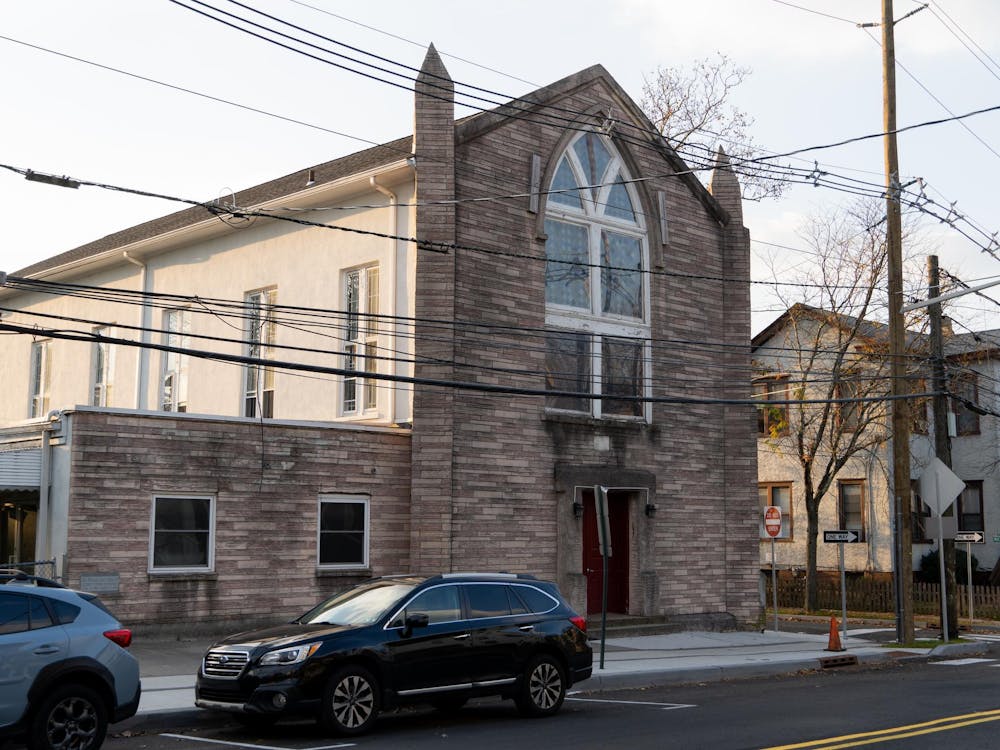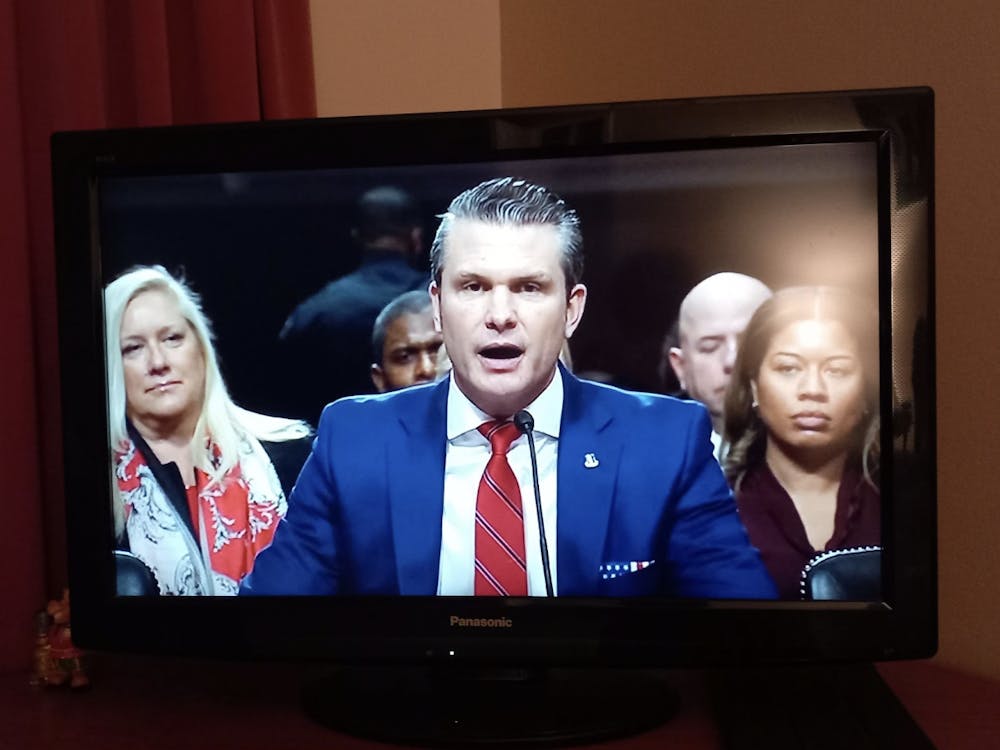Arthur C. Brooks, President of the conservative think tank American Enterprise Institute and a New York Times monthly columnist, sat down with The Daily Princetonian Tuesday afternoon. Below is a lightly edited transcript of the conversation.
The Daily Princetonian: I want to start with the midterm elections. The polls closed exactly a week from yesterday, and I’m wondering to what extent — if at all — Tuesday night was a good night for the Democrats.
Arthur C. Brooks: Well, it was finally a good night for pollsters. It happened more or less the way everybody said it would. Democrats performed really well in purple districts, and picked up enough seats to win back the House and then some.
The only thing that it really says is that polarization continues at pace in the United States, and it’ll continue, at least, for the next two years. Don’t expect a whole lot of progress if you want people to compromise and get policy done.
DP: I saw the exit polls. College-educated voters turned out for Democrats in greater numbers than in 2016, while voters with a high school degree turned out more for Republicans. Polarization is definitely increasing.
AB: Yes, and there were some people who voted for [President Donald] Trump in 2016 who voted Democrat in 2018, particularly in the Upper Midwest states. But again, it’s kind of what you expect. Pundits try to find some pattern in it, but really it’s just so they can make copy.
The real challenge we face is getting a better public policy environment where people are working together — not necessarily agreeing, because agreeing leads to mediocrity, but promoting an environment where there can be a real competition of ideas.
But we’re not close to that right now. We’re not close to that anywhere in American society — whether in Congress or on college campuses.
DP: Well I wonder if part of the problem stems from moderate candidates getting booted out of office in favor of more radical ones. Not just for Republicans, but Democrats too: Just look at [former New York City Congressman] Joe Crowley, who was beaten in his primary by Alexandria Ocasio-Cortez.
AB: It happened in some cases, but then again, look at Arizona. A moderate Democrat defeated a moderate Republican.
That’s actually another thing: there’s nothing too alarming about polarization right now. Luckily, American institutions aren’t breaking down. We’re having a stress test and we’re passing with flying colors. Forget Congress: The press is doing its job. The judiciary. Most of all, state and local governments.
DP: The most underrated aspect of American government.

AB: Exactly. We have an over-federalization of interest in politics. Everybody’s wrapped around national politics all the time.
When I’m in my hometown, Seattle, and people are talking about Trump, I’ll ask them, “Who won the school board election for superintendent?” Oftentimes they don’t even know who’s running. Yet, they’re the ones making the policies that’ll affect you the most, not the federal government.
This is not to say we shouldn’t worry about Trump. He’s making terrible policies. But it shouldn’t come at the expense of focusing on local politics.
DP: Or what if we just stepped away from politics completely? I know you’ve advocated for that in the past.
AB: Yes, it’s OK to step away from politics for a while. I wrote a column recently about how people should take a “politics cleanse.” Nothing’s going to change if you stop following the news for a few weeks. It’s not like the fascists will take over.
Don’t read pundits, especially. They’re just trying to target your confirmation bias and tell you what want to hear. There are very few pundits out there who are in the business of challenging you, because if they do, they won’t get readers.
I mean, even the Times. One of our columnists wrote a piece called, “Pigs All The Way Down.” I hate that she compared Republicans to animals. It’s dehumanizing.
DP: That’s interesting.
AB: It is. I myself have had to step away from politics for a little while. As the president of [the American Enterprise Institute], I have to be more focused on the “climate of policy,” not the “weather of politics.”
Think about it this way: when a climate scientists start reading the daily weather report, you have a mismatch of skills.
DP: That actually goes to my next question. You’ve written several books about effective poverty policies, notably “The Conservative Heart.” Strictly from a policy perspective, I’m curious what you think about Democrats announcing that they’re going to introduce a bill for $15 minimum wage in the House. Do you think that’s good policy?
AB: It’s a bad policy. It’s not because it’s expensive, but a lot of poor people are going to lose their jobs.
About 82 percent of people who get the minimum wage are not poor. I don’t mind that, but when disproportionately, the layoffs will happen at the bottom of the income scale, it’s counter-effective.
The question is what you should do instead.
DP: So, if you were dictator in America, and you could enact one policy to alleviate poverty overnight, what would it be?
AB: For sure, we should expand the earned income tax credit. That idea has some of the most bipartisan support, but still, it doesn’t go far enough.
We need to accompany that with two other things. One is economic policy that insources more jobs. It’s a really good thing that we lowered the corporate tax rate. The Democrats under Obama wanted to get it done, but for political reasons, it couldn’t happen. Most of them now, however, are happy that it’s finally happened.
The other is that we need to expand access to skills and opportunities, especially for vocational skills. There are 7 million unfilled, dignified jobs today that cannot be outsourced. Welders, for example. Healthcare workers, that’s another.
Not everybody needs college. Ninety percent of high school seniors say they’re going to college. Sixty-five percent actually apply, and only 30 percent of them actually graduate. So definitely expand vocational training.
DP: Finally, just to go back to politics for a second, what can we do to fight polarization?
AB: The best way to do it is stand up to the bad forces on your side. If you’re a Democrat standing up to a radical Republican, or vice versa, it’s entirely irrelevant. You hated them then and hate them now.
But if you go on campus, and say, “we’re going to fight for a competition of ideas and all different points of view,” that’s effective.
That’s what I’m trying to do on the center right. I’m trying to stand up to the fringe and say, “What you’re doing is bad for poor people, bad for the country, and not the way we’re going to achieve the new American century.”









